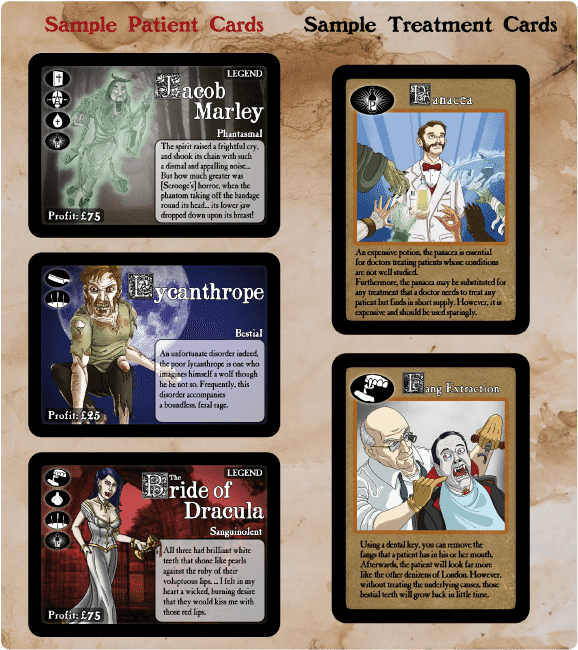Antidote and Gothic Doctor review
Warning: Nerd Alert. Read on at your own risk. Suitable for like-minded individuals prone to reciting eponymous syndromes by moonlight whilst pacing a confined Fibonacci spiral
Recently I have been filling the void between 2am and 3am with whimsical searches on the Kickstarter ‘crowd-funding’ platform to find the next great technological advancement that will benefit medical practice and humanity. However, whilst Kickstarter has many positive and truly inspiring technological innovations on display, it has been the fun educational tools that I have been drawn to.
Two recent Kickstarter games particularly grabbed my attention – Antidote and Gothic Doctor. These medical based games are currently undergoing their proliferative phase prior to general distribution and consumption I urge you to check them out. I am interested to see if card based games such as these with hand management and set collection have a future role in medical education and group interactive learning…but for now just let your inner nerd have fun.
Antidote: A game of deduction, deception and mortality
In Antidote players face a self-imposed time limit simulating a deadly toxin rapidly spreading through the body. Players must work together to deduce the antidote before the toxin takes effect, but wrestle internally to give up any secret information.
You are a biochemical researcher working with your team of scientists, when suddenly you hear a sound you were dreading to hear, the loud CRACK of a massive glass container shattering in the middle of the room. Never mind the loss of research! You all know what that container held…a deadly airborne toxin expected to painfully kill everyone in lab in approximately 15-30 minutes.
Don’t panic…yet. There’s an antidote! Your team has been working on a number of ingestible anti-toxins, one of which might cure you all, but none of you know yet which formula will act as a cure. True to the nature of the double-blind study, no one scientist has complete knowledge of the merits of any of the formulas to serve as a reliable antidote.
Players take turns deciding what action all other players must take: either discard from their hand or trade research with other players. Eventually all your cards will run-out and you will be left with just one that you must “drink” and hope its the Antidote. If this card is the true Antidote, you’re cured and live to play again! If not…you die, but you can always try again!
LITFL Competition: we have three games to give away.
- Your job as chief Biochemical Researcher is to come up with the name for one of the formulas which will actually be used in the game!
- Choose the colour (Red, Aqua, Green, Navy, Lime, Purple or Fuchsia)
- Creatively design the formula name
- Add your proposal to the comments section below (before 20 July 2014) and the game creator will choose the top three
Gothic Doctor – A Game of Monstrous Medicine
Gothic Doctor is a standalone card game for 2-4 players. You take on the role of physician in a practice that caters to the monsters and miscreants of Victorian literature. Play cards from your hand to treat patients in the waiting room…
1850’s London is a good place to be a doctor, especially if you cater to the, shall we say, least savoury members of society. While your colleagues are running round day in and day out tending to every butler with glass in his hand or hysterical socialite, you’ve found your niche: the patients whom literally no one else will touch.
- Patients attending the virtual waiting room include banshees, vampires, witches, the mortally wounded and bite victims with individual profile cards providing valuable information as to the best treatment options for their afflictions.
- Treatment cards include the less evidence based medical and surgical procedures such as exorcism, fang extraction, a good shave and trepanation.
- Action Cards such as ‘hypochondriac, ‘hit the books’ and ‘it’s in here somewhere’ affect individual and group gameplay.
Using a variety of ‘treatments’ from their hands, players (the doctors) cure a variety of ailments from Gothic literature such as lycanthropy, vampirism, insanity, and many others. At the end of the night, the doctor who earns his or her practice the most money wins – becoming the newest partner in the practice.


